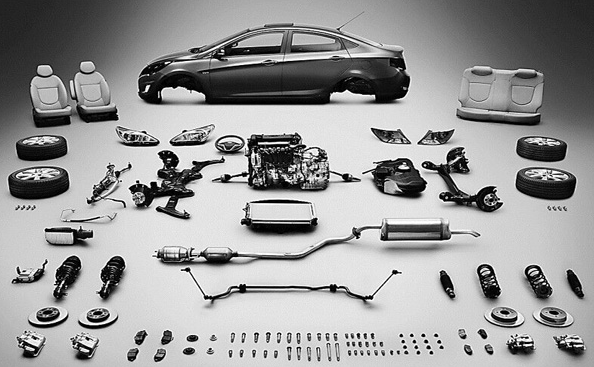In the global automotive industry, automotive parts suppliers play a crucial role. Whether for vehicle manufacturing or after-sales maintenance and repairs, the quality of automotive parts and the stability of the supply chain directly impact vehicle performance and lifecycle. This article explores the topic of "common automotive parts suppliers," discussing the main types of suppliers, their characteristics, and key players in the market, helping readers better understand the workings and trends of this industry.

Types of Automotive Parts Suppliers
Automotive parts suppliers can be classified into several categories, each with its unique advantages and market positioning:
Original Equipment Manufacturer (OEM) Suppliers
OEM suppliers provide parts that are identical to those produced by the original vehicle manufacturer. These parts usually come with high-quality guarantees and comply with the strict standards of automakers. OEM parts are typically used for new vehicle production or for maintenance and repair of vehicles. These parts have high brand recognition and consumer trust, making them suitable for customers who prioritize vehicle quality and performance.Aftermarket Suppliers
Aftermarket suppliers provide parts that are not made by the vehicle’s original manufacturer but by independent producers. These parts are designed to fit various brands and models and are generally more affordable than OEM parts. While the quality and performance of aftermarket parts may vary, they offer a cost-effective option for vehicle owners when maintaining or repairing their vehicles.Custom Parts Suppliers
Some automotive parts suppliers specialize in providing customized parts for high-end vehicles or specific customer needs. For example, they may offer customized body parts or performance-enhancing components for sports cars, luxury cars, or modified vehicles. These suppliers often drive innovation and product uniqueness through research and development, catering to niche markets.Used Parts Suppliers
Used parts suppliers primarily offer second-hand parts, which are typically sourced from vehicle scrap or recycling. While these parts are often more affordable, their quality and performance can be unpredictable. Consumers need to exercise caution when purchasing used parts.
Current Market Overview of Automotive Parts Suppliers
As the automotive industry continues to grow, automotive parts suppliers play an increasingly important role in the global market. With the rising number of vehicles on the road, the automotive maintenance and repair market continues to expand. According to market research reports, the global automotive parts industry is worth several trillion dollars and is expected to grow further in the coming years.
China, as one of the largest automotive markets in the world, is home to numerous automotive parts suppliers, including both internationally renowned brands and many domestic companies. Among these, companies like Zhengpei Auto Parts (Danyang) Co., Ltd. have gained significant recognition by focusing on the production and sale of high-quality automotive parts and expanding their product offerings to meet global demand.

Common Automotive Parts Suppliers and Their Products
Zhengpei Auto Parts (Danyang) Co., Ltd.
Located in Danyang, Jiangsu Province, Zhengpei Auto Parts (Danyang) Co., Ltd. specializes in the production and wholesale of automotive parts for brands like Chevrolet, Buick, and Cadillac. Their product range includes engine components, brake systems, body parts, and more. These parts meet OEM standards and are widely used in vehicle maintenance, repair, and new vehicle production.Bosch
As one of the world’s leading automotive parts suppliers, Bosch provides a full range of automotive components, including powertrain parts, electronics, and sensors. Bosch products are known for their advanced technology and high-quality standards and are widely used in both vehicle manufacturing and the aftermarket.Continental
Continental is a global leader in automotive technology, offering components for braking systems, powertrains, tires, sensors, and more. Continental focuses on innovation and sustainability, driving the development of eco-friendly automotive parts.Hella
Hella is a globally recognized supplier of automotive lighting and electronics. The company provides headlights, sensors, lighting equipment, and other automotive components, with a strong presence in the global market due to its expertise in lighting technology.Hitachi Automotive Systems
Hitachi Automotive Systems offers high-performance components for powertrains, electric systems, and autonomous driving technologies. Their products are widely used by Japanese automakers and have a strong presence in the growing smart car sector.
Challenges and Opportunities for Automotive Parts Suppliers
With the rapid development of the global automotive industry, automotive parts suppliers face increasing competition and evolving industry trends. For example, the rise of electric vehicles (EVs) requires parts suppliers to adapt quickly to new technologies and adjust their product lines to meet new market demands. Additionally, stricter environmental regulations are driving parts manufacturers to develop more sustainable, energy-efficient products.
At the same time, the development of smart and autonomous vehicle technologies presents new opportunities for parts suppliers. Innovations in sensors, autonomous driving systems, and in-car entertainment systems offer suppliers a growing market for advanced automotive components.
Conclusion
Automotive parts suppliers play an indispensable role in the global automotive industry. As technology advances and market demands shift, automotive parts suppliers are continuously innovating to meet the diverse needs of the market. From OEM parts to aftermarket products, consumers can choose parts suppliers based on their needs, ensuring the performance and safety of their vehicles.
Companies like Zhengpei Auto Parts (Danyang) Co., Ltd., which focus on high-quality, reliable products and innovative services, demonstrate the importance of quality and expertise in the automotive parts market.
Understanding the different types of suppliers and their products helps consumers make more informed decisions when purchasing automotive parts, ensuring the continued performance and safety of their vehicles.
